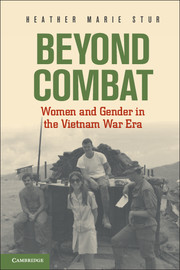Book contents
3 - “We Weren't Called Soldiers, We Were Called Ladies”
WACs and Nurses in Vietnam
Published online by Cambridge University Press: 05 June 2012
Summary
During her tour of duty as an Air Force flight nurse, Linda Pugsley saw the carnage of war up close. Death was not always the worst part of it – sometimes a severely wounded soldier drove home hard the reality of what the war did to those who fought in it. On one of her runs, she treated a young serviceman who had suffered a massive abdominal injury and had lost his testicles, a leg, an arm, and his sight. As she prepared patients to be evacuated from Vietnam, he called her over and asked her whether she thought his girlfriend would still love him. She took his remaining hand and said reassuringly, “Oh sure, honey. You're gonna go home a hero.” It might have been a lie, but in that moment, it was what he needed to hear. “To the wounded, we were like angels,” Pugsley said. Having a female nurse to talk to allowed servicemen to be emotional in ways they could not be with their comrades. “They have to be strong for their buddies. You don't show a lot of emotion around your buddies,” said Paula Quindlen, an Army nurse who served at the 27th Surgical Hospital in Chu Lai, adding that many wounded men, especially amputees, sought a woman's reassurance as they wondered whether their girlfriends would reject them because of their injuries. Seen as confidantes, nurses bore the weight of wounded soldiers’ emotions, revealing once again the emotionally exhausting nature of women's work as defined by the ideology of domesticity.
Lynda Van Devanter, the Army nurse whose memoir Home Before Morning was one of the first works to bring attention to American women's Vietnam experiences, explained in a 1980 interview that whereas men of her generation were taught stoicism, women were taught to be emotionally expressive. In Vietnam, however, “women were forced to negate these emotions in order to attend to the higher priority tasks at hand.” Although nurses were expected to present an image of womanhood reflecting Cold War domesticity, “staying feminine became an impossible task,” Van Devanter said. “There's a toughness you take on. It's thought of as a masculine, macho characteristic. It's not masculine, but an attitude of strength and trying to survive.”
- Type
- Chapter
- Information
- Beyond CombatWomen and Gender in the Vietnam War Era, pp. 105 - 141Publisher: Cambridge University PressPrint publication year: 2011



